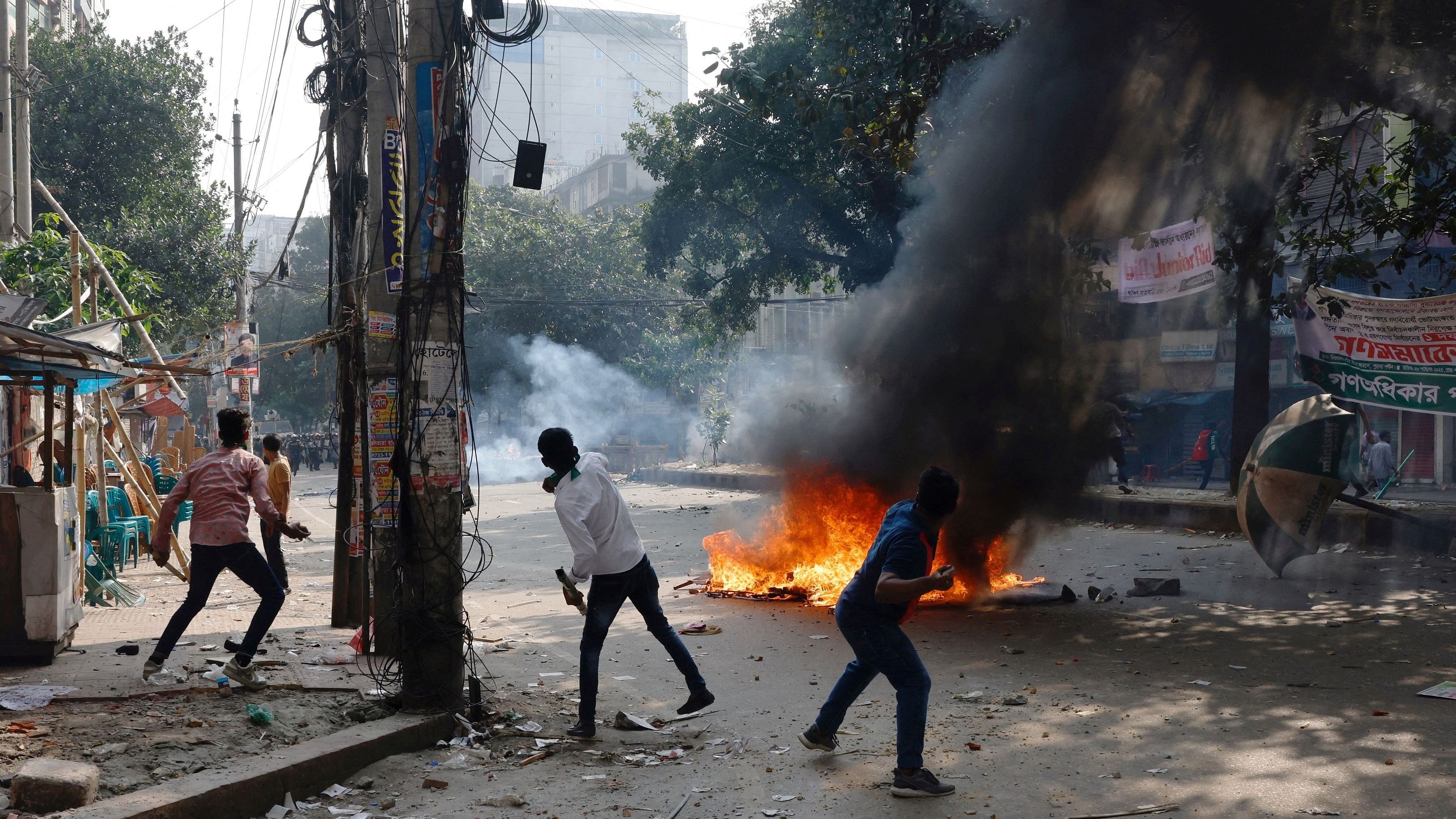
Supporters of Bangladesh Nationalist Party throw brickbats towards police during a clash in Dhaka, Bangladesh, October 28, 2023.
Credit: Reuters Photo
Dhaka: Bangladesh police on Sunday arrested a senior leader of the Opposition BNP, a day after deadly clashes at an anti-government rally organised by his party claimed two lives, heightening tensions in the country ahead of the general elections expected in January.
Bangladesh Nationalist Party (BNP) secretary general Mirza Fakhrul Islam Alamgir was arrested from his home in the Gulshan neighbourhood, an official of the party’s press wing said.
A Bangladeshi policeman and a BNP activist were killed and more than 200 people, including security personnel, were injured on Saturday as violence erupted during rallies called by the ruling and opposition parties in Dhaka.
The BNP, led by former prime minister Khaleda Zia, organised a grand rally here on Saturday demanding the resignation of Prime Minister Sheikh Hasina to allow free and fair elections under a non-party interim government. Prime Minister Sheikh Hasina's party also held a peace rally in response to the Opposition rally.
“We have taken him (Alamgir) to our custody for subsequent legal actions,” a spokesman of Dhaka Metropolitan Police’s detective branch told reporters.
Alamgir's wife Rahat Ara said that the police initially visited their home, and left with a hard disk containing CCTV camera footage from their house and building. They later returned and took Alamgir, 75, into custody.
"He (Fakhrul) is very ill," the wife said.
BNP is observing a countrywide strike on Sunday in response to the police action that forced it to abruptly end its grand rally on Sunday.
Prime Minister Hasina’s ruling Awami League asked party units to stage simultaneous peace rallies across the country.
Meanwhile, violence continued unabated in the country on Sunday.
Fire service officials and police said a bus driver’s assistant was killed as unidentified miscreants set on fire a static bus on Sunday.
In another incident, an empty bus was set on fire in front of downtown Baitul Mokarram National Mosque as the BNP-called nationwide stoppage began.
Riot police overnight besieged the BNP's central office while authorities called out paramilitary troops ahead of the countrywide strike, a day after violence gripped downtown Dhaka.
Witnesses said armed police equipped with riot cars and water cannons took position around the empty main office of BNP, warning stern punitive actions against security breaches “in the name of stoppage”.
Traffic was relatively thin on the roads on Sunday morning. Many shops and businesses were shuttered in areas of possible spots of violence like Naya Paltan, Purana Paltan, and Motijheel.
“A political party has called a strike. Police will take stern legal action if someone disrupts peoples’ free movement or tries to breach the security,” Dhaka Metropolitan Police Commissioner Habibur Rahman told a late-night media briefing.
He said strike calling a strike was a democratic right “but similarly the people have the right not to respond to the call”, but an anarchic situation cannot be created in the name of general strikes.
Paramilitary Border Guard Bangladesh (BGB), meanwhile, said they deployed 11 platoons or over 300 troops to maintain public order in the capital.
The BNP is demanding the restoration of the election-time non-party caretaker government system, under which four elections from 1991 to 2008 were held.
The December 2008 elections installed Hasina's Awami League, while the subsequent 2014 and 2008 polls were held under the incumbent government, which scrapped the constitutional provision after assuming office in January 2009.
BNP chairperson Zia, 79, who served as premier for two terms, is currently being treated in a specialised private hospital with severe chronic ailments for several weeks. Before being shifted to hospital, she was under house arrest to serve a 17-year prison term on two graft charges.
Her elder son Tarique Rahman, also a “fugitive convict” on several criminal charges steers the party from London, where he is believed to have sought asylum.
Major Western nations, including the US, are calling for the Bangladesh polls to be fair, credible and inclusive for the sake of democracy.
On Thursday, Bangladesh’s independent Election Commission said it was yet to see a “favourable environment” for the scheduled January 2024 polls.
“We want to organise the election. As the organiser, we would like to say the favourable environment we were expecting has not been achieved yet,” Chief Election Commissioner (CEC) Habibul Awal told journalists.
Awal, however, said his office was preparing to hold the election as scheduled.